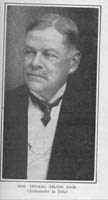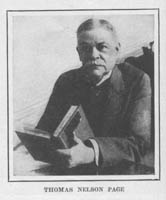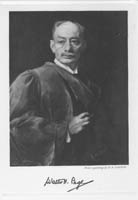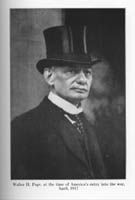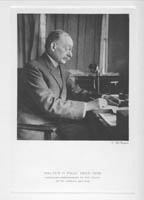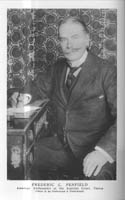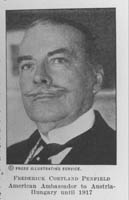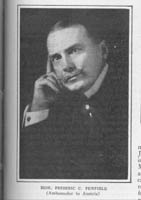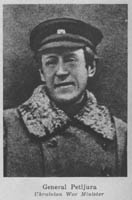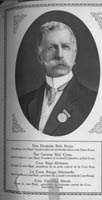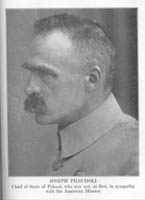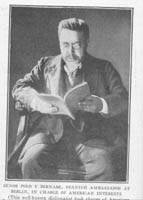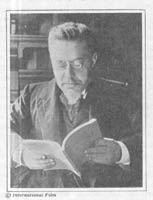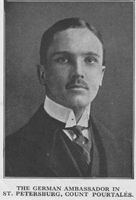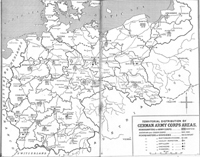Table of Contents
Key Figures
Statesmen
a | b | c | d-e | f | g | h-i | j-l | m | n-o | p | r | s | t-v | w-y
Thomas Nelson Page (1853-1922)
An American novelist and diplomat, Page practiced law in Richmond, Virginia from 1874 to 1893 before moving to Washington, DC. While in the nation's capital, he wrote a number of number of books about the South. In 1913, Woodrow Wilson appointed Page U.S. Ambassador to Italy and he served in Rome throughout World War I, returning to the U.S. in 1919. Page strongly supported the YMCA in its efforts to establish a War Prisoners' Aid program for German and Austro-Hungarian prisoners in Italian POW camps.
Walter Hines Page (1855-1918)
An American journalist and diplomat, Page served as the U.S. Ambassador to Great Britain during World War I. Page worked as an editor for the Forum, the Atlantic Monthly, and The World's Work, and was a partner in the publishing company Doubleday, Page and Company. A strong supporter of Woodrow Wilson, the new president appointed him Ambassador to the Court of St. James in 1913. Page was fervently pro-British and supported the Allied war effort, a position that undermined Wilson's neutrality policy during the first few years of the war.
Stefan Panaretoff (1853-1931)
A Bulgarian educator and diplomat, he attended Robert College in Constantinople, a school with close ties to the American YMCA. He became an instructor at the institution in 1872 and three years later was promoted to professor of Bulgarian literature. Panaretoff married an American and wrote a Bulgarian-English dictionary. During the Bulgarian Atrocities in 1876, Panaretoff publicized the Turkish massacres of Bulgarian Christians in an effort to sway Western public opinion. He traveled to Britain to represent the Bulgarian people. In 1880, Panaretoff conducted another unofficial diplomatic mission to London to gain support for Bulgarian acquisition of Eastern Rumelia. Panaretoff served as the interpreter for John R. Mott's visit to Sofia in 1911, after the World's Student Christian Federation Conference in Constantinople. When the Bulgarian government decided to send a diplomatic representative to the United States, Panaretoff was chosen. He arrived in Washington, DC in December 1914 and played a critical role in maintaining Bulgarian relations with the Wilson administration through World War I, despite a myriad of calls for the breaking of diplomatic ties with the Central Power ally. In Fall 1921, Panaretoff served as the ad hoc Bulgarian representative to the League of Nations after the international organization admitted Bulgaria as a member state. Panaretoff resigned as Bulgarian Minister to the United States in June 1925, but remained in Washington as a professor at George Washington University until his death in October 1931.
Frederic Courtland Penfield (1855-1922)
As an American diplomat, Penfield served as the United States Ambassador to Austria-Hungary during World War I. He joined the U.S. Diplomatic Corps and became the Consul General in Cairo from 1893 to 1897. The Wilson administration appointed Penfield as ambassador to Vienna in 1913 and supervised Allied interests in the Dual Monarchy during the period of American neutrality. Recognizing the limitations of the American diplomatic staff to support POW inspections and welfare relief, Penfield strongly supported the development of YMCA War Prisoners' Aid operations in Austria-Hungary. When the United States broke off diplomatic relations with Austria-Hungary in 1917, Penfield returned to the United States.
Simon Petliura (1879-1926)
A Ukrainian general and political leader, Petliura was a leader in the Ukrainian separatist movement after the February 1917 Revolution in Russia. He helped organize the Ukrainian Conference which selected the members of the Ukrainian Rada in Kiev. Late in June 1917, the Rada declared the establishment of the Autonomous Ukrainian Republic, despite the protests of the Provisional Government in Petrograd. The Bolsheviks, seeking to gain a foothold in the Ukraine, set up the Provisional Ukrainian Soviet Government in Kharkov in November 1917. Both governments set representatives to the Peace Conference negotiations in Brest-Litovsk. The Germans decided to recognize the Rada and forced the Bolsheviks to withdraw from the Ukraine by dispatching an Austro-German army of occupation. When the Rada was unable to provide the promised food and raw materials for export to Germany, the Germans installed Pavel Petrovich Skoropadsky as their dictator in the Ukraine. After the Armistice in November 1918 and the withdrawal of Austro-German forces, Petliura and other Ukrainian nationalists declared the Ukrainian People's Republic and set up the Directory to rule the country. They captured Kiev in December 1918, but the Bolsheviks seized the city in February 1919. Petliura's Ukrainian Army continued to fight the Bolsheviks and General Anton Denikin's Volunteer Army, a White Russian force which seized Kiev in September 1919. The Bolsheviks regained Kiev in December 1919 and Petliura formed an alliance with the Poles. The Ukrainians supported the Polish invasion of the Ukraine in April 1920, which led to the Polish occupation of Kiev in May. In June 1920, the Red Army mounted a counter-attack and Petliura accompanied the Polish Army during the general retreat. He fled to Poland and later to Paris, where he was assassinated in 1926.
Kurt W. von Pfuel
A former German cavalry general, von Pfuel was the Chairman of the Central Committee of the German National Red Cross during World War I. He became a member of the German YMCA War Prisoners' Aid Committee in April 1916, organized by Archibald C. Harte in Berlin. This organization oversaw WPA operations in the German empire and became the model for WPA relief efforts in other countries.
Josef Pilsudski (1867-1935)
A Polish general and statesman, Pilsudski was an ardent Polish nationalist. He joined the Young Poles and was sentenced to five years' imprisonment in Siberia in 1887 for conspiring to assassinate Tsar Alexander III. After his return to Poland in 1892, Pilsudski became the leader of the Polish Socialist Party and founded the radical journal The Workman in 1894. Russian authorities arrested Pilsudski in 1900, but he escaped to Britain. He returned to Poland in 1902 and resumed his political agitation. Pilsudski secretly organized a Polish army and when the war began in 1914, he offered an army of 10,000 men to serve in the Austrian Army. The Polish Legion fought against the Russians in support of Polish independence. He resigned from command in 1916 because of Austro-German interference in Polish affairs and worked actively for complete independence. When Germany and Austria-Hungary established the Polish Regency and declared the independence of Russian Poland in November 1916, Pilsudski accepted the leadership of the military commission in Warsaw. Tensions between the Central Powers and Pilsudski emerged and the Germans decided to intern Pilsudski and Poles who refused to take the oath of allegiance to the new Polish regime and continue to fight the Russians on the Eastern Front. The Germans incarcerated Pilsudski in Magdeburg for the duration of the war. In November 1918, Pilsudski gained his release and he immediately returned to Poland where he was elected chief of state and generalissimo of the new Polish Army. Pilsudski commanded the Polish Army in a series of campaigns against the Lithuanians, Ukrainians, and Bolsheviks from 1919 to 1920 to establish Polish claims in the East. In April 1920, he launched an invasion of the Ukraine, which resulted in a massive counter-offensive by the Red Army. The Poles retreated to the Vistula, but Pilsudski succeeded in flanking the Soviets in August 1920 and forcing the Red Army to retreat in disarray. He served as the absolute dictator of Poland as provisional president until the Polish Parliament ratified the new constitution in 1921. As a field marshal, Pilsudski maintained political power and launched a coup d'etat in May 1926, which overthrew the Witlos ministry. He installed a new government, under Kazimierz Bartel and accepted the post of Minister of War, making him the virtual dictator of Poland. From 1926 to 1928 and in 1930, Pilsudski was the Premier of Poland, but kept his post as Minister of War and Commander-in-Chief of the army, which allowed him to control Polish politics until his death in 1935.
Luis Polo de Bernabe
Spanish Ambassador to Germany during World War I, Polo de Bernabe represented Allied interests in the German Empire during the war, including the care of Allied prisoners of war. He conducted prison camp inspections and reported on conditions through the Spanish government. In April 1916, Polo de Bernabe became an honorary member of the German YMCA War Prisoners' Aid Committee, established by Archibald C. Harte in Berlin. This organization supervised WPA operations across the German Empire and became the model for WPA relief services in other countries. With the Wilson administration's decision to sever diplomatic relations with Berlin in February 1917, Polo de Bernabe assumed the diplomatic interests of most of the Allied Powers in the German Empire.
Friedrich von Pourtales (1853-1928)
A German count and diplomat, Pourtales served as the German Ambassador to Russia from 1907 to 1914. He desperately worked to dissuade the Russians from declaring war against Austria-Hungary in support of Serbia in August 1914. Russian military mobilization forced the Germans to declare war against the tsarist government as part of the von Schlieffen Plan.
